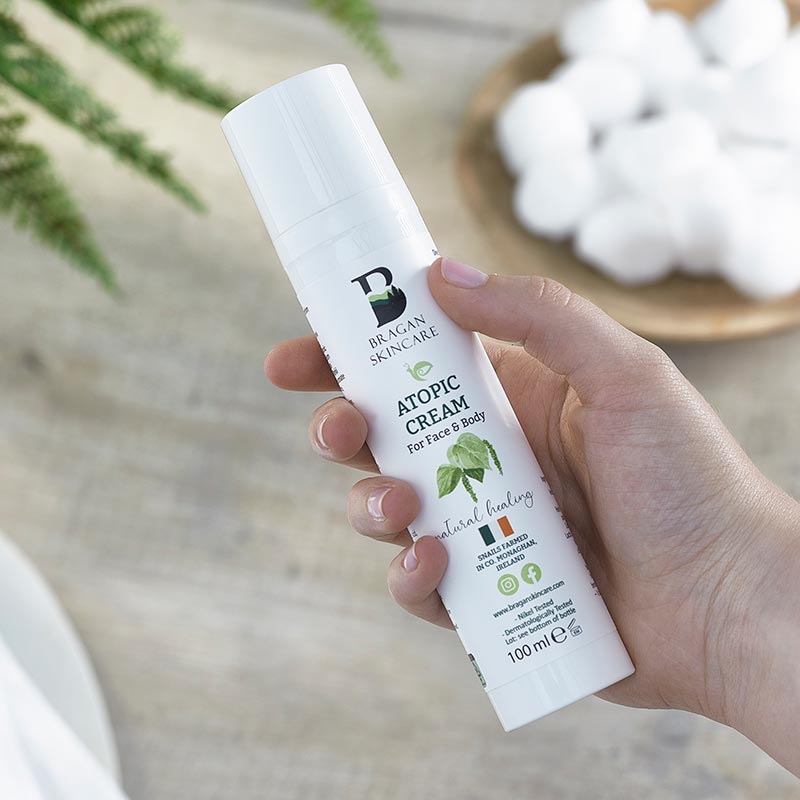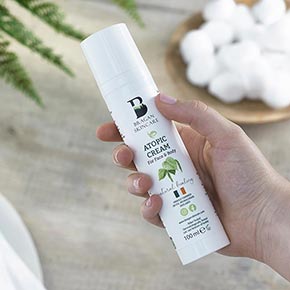Eczema on Genital Area: Causes, Prevention, and Treatment
Fast answer: eczema on the genital area
- It is not an STI/STD
- It affects external genital skin
- Gentle, fragrance-free care is key
- Avoid irritants and friction
- Moisturising consistently helps prevent flare-ups
Eczema is a common skin condition affecting people of all ages and can appear on various parts of the body, including the sensitive genital area. When it occurs in this region, eczema can be especially uncomfortable and may impact daily life. This blog post provides an in-depth look at the causes, symptoms, and prevention of eczema on the genital area, along with effective treatment options. We’ll also highlight how Bragan Skincare’s Atopic Cream can help soothe and protect sensitive skin in this delicate region.
This page focuses specifically on eczema affecting the genital area.
If you’re looking for a full overview of symptoms, causes, treatments, and daily care, see our complete genital eczema hub.

What Is Eczema on the Genital Area?
Eczema on the genital area causes inflammation, itching, and irritation on delicate external skin. Because this skin is more sensitive, symptoms can feel especially uncomfortable and disruptive.
Genital eczema can affect anyone, regardless of age or gender. Although it can feel difficult to talk about, gentle care and the right treatment approach usually help manage symptoms effectively.
Types of Eczema That Can Affect the Genital Area
Several forms of eczema may affect the genital skin, including:
- Atopic dermatitis – the most common type, often linked to sensitive or eczema-prone skin
- Contact dermatitis – caused by irritants or allergens such as soaps, detergents, or fabrics
- Seborrhoeic dermatitis – can cause red, scaly patches in oil-producing areas
- Irritant dermatitis – triggered by moisture, friction, sweat, or harsh products
Each type has different triggers, but all benefit from gentle skincare and avoiding irritants.
Important reassurance
Eczema on the genital area is not a sexually transmitted infection (STI/STD) and cannot be passed through sexual contact. Because symptoms can resemble fungal infections or other skin conditions, it’s sensible to seek medical advice if symptoms persist or worsen.
Symptoms of Eczema on the Genital Area
The symptoms of genital eczema are similar to eczema on other parts of the body but are often exacerbated due to the delicate nature of the skin.
- Persistent Itching: Itching can be intense and is often worse at night.
- Redness and Inflammation: Affected areas may appear red, swollen, and warm to the touch.
- Dry, Flaky Skin: Skin may feel tight and develop rough patches.
- Soreness: The area may become tender or painful, especially after scratching.
- Irritation: Increased sensitivity to clothing, personal care products, or hygiene practices.
Causes of Eczema on the Genital Area
Eczema in the genital area can result from a combination of internal and external factors. Identifying the root cause is crucial for managing the condition effectively.
Common Causes
- Irritants
- Harsh soaps, body washes, or detergents.
- Scented personal care products or lubricants.
- Allergens
- Reactions to fabrics like wool or synthetic materials.
- Sensitivities to certain ingredients in personal care products.
- Moisture and Friction
- Excess sweat or dampness caused by tight clothing.
- Rubbing of the skin during physical activities.
- Stress
- Emotional stress can exacerbate eczema symptoms and lead to flare-ups.
- Underlying Skin Conditions
- Fungal infections or conditions like psoriasis can overlap with eczema.
Best Ways to Avoid Eczema on the Genital Area
Preventing eczema in this sensitive area is largely about minimising triggers and adopting skin-friendly habits. Here are the most effective strategies:
1. Use Gentle Cleansers
Avoid soaps and body washes that contain harsh chemicals or fragrances. Instead, opt for mild, fragrance-free cleansers specifically formulated for sensitive skin.
2. Keep the Area Moisturised
Dry skin is more prone to irritation and eczema flare-ups. Regularly applying a high-quality moisturiser,can help maintain skin hydration and protect against triggers.
3. Wear Loose, Breathable Clothing
Choose natural fabrics like cotton that allow the skin to breathe. Tight or synthetic clothing can trap heat and moisture, aggravating symptoms.
4. Avoid Known Irritants
Switch to hypoallergenic laundry detergents and avoid using scented or alcohol-based personal care products in this area. Always patch-test new products before using them.
5. Practice Good Hygiene
Gently wash the genital area with lukewarm water and pat dry with a soft towel. Avoid scrubbing or using rough materials that can irritate the skin.
6. Stay Cool and Dry
Excess heat and sweat can worsen eczema. Keep the area dry by changing out of damp clothing immediately after exercising or swimming.
7. Manage Stress
Stress is a common trigger for eczema flareups. Incorporating relaxation techniques such as yoga, meditation, or deep breathing can help reduce stress levels.
8. Avoid Scratching
Scratching can worsen inflammation and lead to secondary infections. Keep nails short and consider wearing cotton gloves at night to prevent scratching in your sleep.
How Bragan Skincare’s Atopic Cream Helps
When eczema flares up, using a product specifically designed for sensitive skin can make a world of difference. Bragan Skincare’s Atopic Cream is formulated with snail mucin, a natural ingredient known for its hydrating and healing properties.
Key Benefits
- Deep Hydration: Keeps the skin soft and supple.
- Gentle Formula: Free from harsh chemicals, fragrances, and parabens.
- Soothing Action: Reduces redness, itching, and inflammation.
- Supports Skin Repair: Encourages the natural healing of damaged skin.
This cream is ideal for everyday use and can be applied to sensitive areas, including the genital region. Its soothing formula provides instant relief and long-lasting hydration.

Treatment Options for Eczema on the Genital Area
If prevention strategies aren’t enough to manage eczema symptoms, the following treatments can help alleviate discomfort and promote healing:
1. Topical Moisturisers
Applying a high-quality, fragrance-free moisturiser several times a day can keep the skin hydrated and prevent dryness.
2. Anti-Itch Creams
For severe itching, over-the-counter anti-itch creams or ointments may provide relief. Consult a healthcare professional before use.
3. Corticosteroids
Mild topical steroids may be prescribed to reduce inflammation during severe flare-ups. Always use these under medical supervision.
4. Antihistamines
Oral antihistamines can help manage itching, especially if it interferes with sleep.
5. Treating Secondary Infections
If scratching has led to an infection, antibiotics or antifungal medications may be necessary. Seek medical advice if you notice signs of infection, such as increased redness, warmth, or discharge.
6. Natural Remedies
Some people find relief from natural remedies, such as oatmeal baths or aloe vera. However, always consult a dermatologist before trying new treatments.

Special Considerations for Children
Children with eczema on the genital area require extra care, as their skin is more delicate. Parents should:
- Use child-safe, fragrance-free products like Bragan Skincare’s Atopic Cream.
- Dress them in breathable, loose-fitting clothing.
- Distract them from scratching by keeping their hands busy.
When to Seek Medical Advice
While many cases of genital eczema can be managed with home care, certain situations warrant medical attention:
- Symptoms persist or worsen despite treatment.
- You notice signs of a secondary infection.
- The itching is severe and interferes with sleep or daily activities.
A healthcare professional can provide a tailored treatment plan to address your specific needs.
Further trusted reading can be found on the HSE website.
Lifestyle Tips for Managing Eczema
Managing eczema often requires a combination of skincare and lifestyle adjustments. Here are some additional tips to support your skin health:
1. Follow a Balanced Diet
A diet rich in vitamins, minerals, and antioxidants can help support overall skin health. Incorporate foods like leafy greens, fish, and nuts, which contain skin-friendly nutrients.
2. Stay Hydrated
Drink plenty of water throughout the day to keep your skin hydrated from within.
3. Avoid Hot Showers
Hot water can strip the skin of its natural oils, leading to dryness and irritation. Stick to lukewarm water when bathing.
4. Use a Humidifier
If you live in a dry climate or during colder months, using a humidifier can help maintain moisture in the air and prevent your skin from drying out.
Why Choose Bragan Skincare’s Atopic Cream?
Bragan Skincare is committed to providing high-quality, effective solutions for sensitive skin. Our Atopic Cream is enriched with snail mucin, a natural powerhouse ingredient that hydrates, repairs, and soothes.
What Sets Us Apart?
- Dermatologist recommended for sensitive and eczema-prone skin.
- Gentle enough for daily use on the most delicate areas.
- Backed by science and trusted by customers worldwide.
Incorporating Bragan Skincare’s Atopic Cream into your skincare routine can help you achieve healthier, more comfortable skin while reducing flare-ups.
Final Thoughts
Eczema on the genital area can be challenging to manage, but it’s important to remember that effective treatments and prevention strategies are available. By understanding triggers, adopting skin-friendly habits, and using products like Bragan Skincare’s Atopic Cream, you can minimise discomfort and protect your sensitive skin.
Taking proactive steps today can lead to healthier skin tomorrow. Start your journey with Bragan Skincare and experience the soothing, healing power of our Atopic Cream. Your skin deserves the best care—let us help you achieve it.
Looking for more detailed guidance?
Our complete genital eczema hub explains symptoms, triggers, treatments, and daily care in one place.
Atopic Skin Repair Cream
Bragan Skincare Snail Mucin Atopic Cream At Bragan Skincare, we believe in doing things differently. Our Snail Mucin Atopic Cream isn’t just another product on the shelf—it’s a promise to your skin. Powered by the unmatched healing properties of pure snail mucin, this cream is specially crafted to soothe redness, calm irritation, and restore balance to even the most sensitive skin. Perfect for those suffering with Eczema, Psoriasis. Dermatitis and many other skin condition. Why snail mucin? Because it works. Packed with naturally occurring allantoin, glycolic acid, and peptides, it’s a game-changer for reducing redness, promoting repair, and deeply hydrating…
Featured Bragan Skincare Products
-
€32.51 – €81.30Price range: €32.51 through €81.30Select options This product has multiple variants. The options may be chosen on the product page
-
€81.30Select options This product has multiple variants. The options may be chosen on the product page

